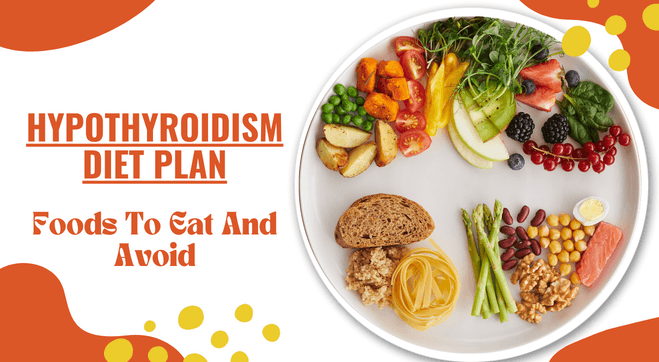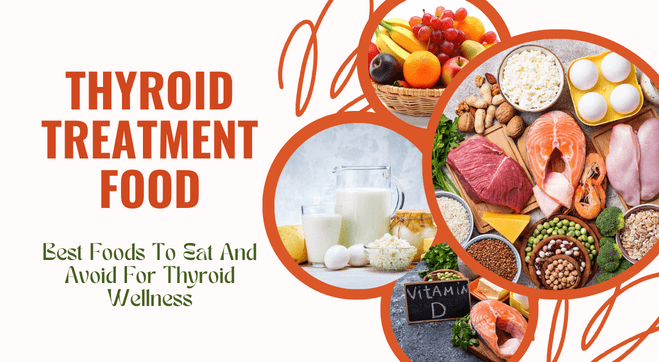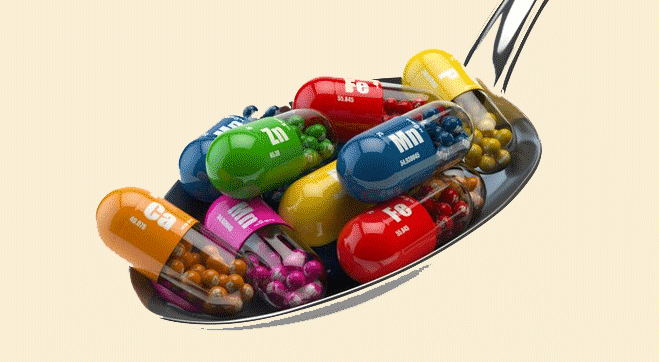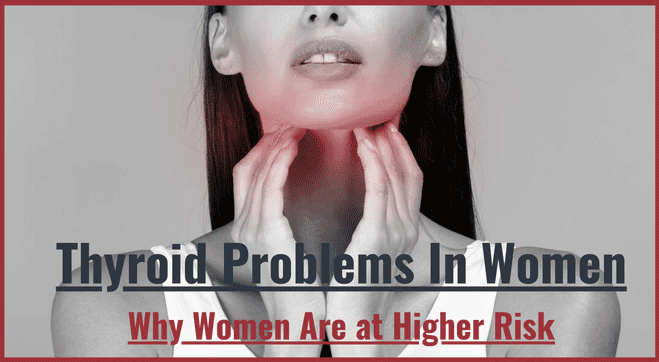Hypothyroidism refers to a state in which the thyroid gland does not release an adequate amount of thyroid hormone. This causes an underactive thyroid, which results in symptoms like fatigue, constipation, depression, weight gain, slow movements, muscle cramps, and loss of libido, among other things. The good news is that you can take thyroid medications to treat the condition. Additionally, eating the right foods (and avoiding the wrong ones) can help you better manage the symptoms.
Can Following a Certain Diet Help Manage Hypothyroidism?
Hypothyroidism can arise due to a number of causes 1, including iodine deficiency, consumption of certain medication, acute thyroid inflammation, thyroid surgery, and medical treatments that may have damaged the thyroid. While medical intervention and tests are required to understand the underlying causes, there are ways to manage the condition by following a nutritious hypothyroidism diet.
Many studies 2 have indicated that following a gluten-free diet, an anti-inflammatory diet, or an autoimmune elimination diet can help people who suffer from Hashimoto’s thyroiditis — one of the most familiar causes of hypothyroidism.
Also, some nutritional deficiencies 3 can worsen the symptoms of hypothyroidism. So, it’s important to monitor for deficiencies of:
- Vitamin D
- Thiamine
- Zinc
- Vitamin B6
- Magnesium
- Iodine
- Selenium
It’s also important for people who suffer from hypothyroidism to follow a calorie-counted diet since it could promote weight loss 4, which is one of the most common symptoms of hypothyroidism. Apart from following a nutrient-rich diet, making positive lifestyle changes can also positively impact the health of people with hypothyroidism.
What Are The Best Foods For Hypothyroidism?
Doctors recommend following an overall healthy and nutritious diet to improve your health and lose/manage weight. Keep in mind that following a healthy, nutrient-dense diet can help decrease the risk or severity of a number of conditions linked with hypothyroidism, including obesity, heart disease 5, and type 2 diabetes.
If you have been diagnosed with the condition and are looking for the best diet for hypothyroidism, try consuming the following foods to better manage the symptoms and improve your health.
Best Fruits For Hypothyroidism
Some of the best fruits for hypothyroidism are as follows:
- Pineapples: Pineapples are one of the best fruits that contain a high amount of manganese and vitamin C. The fruit also contains bromelain, which can help lower inflammation in the body, making it a great option for people with hypothyroidism.
- Berries: Low-glycemic berries like blueberries, raspberries, and blackberries should be a part of your diet if you suffer from hypothyroidism.
- Apples: Rich in antioxidants and fibre, apples are a great way to support your gut — this, in turn, can help your thyroid function.
- Citrus Fruits: Citrus fruits, like oranges, have a high amount of vitamin C. This helps disarm any free radicals in the body, which protects the cells against damage. However, if you want to include oranges in your diet, avoid buying pre-packaged orange juice from the store. Instead, eat the fruit whole.
Apart from these fruits, you can also include peaches, pears, grapes, and bananas in your diet if you have hypothyroidism.
Best Vegetables For Hypothyroidism
If you have hypothyroidism, it’s important to eat a diet that is rich in fibre — this essentially means you need to consume sufficient vegetables. Here are a few different types of vegetables you can consider adding to your Hypothyroidism diet plan:
- Non-Starchy Greens And Vegetables: Greens like spinach, artichokes, asparagus, mushrooms, spinach, peppers, carrots, and zucchini should be consumed by people who have been diagnosed with hypothyroidism.
- Starchy Vegetables: Starchy vegetables like potatoes, sweet potatoes, butternut squash, and peas can also be consumed by those with hypothyroidism.
Other Foods Good For Hypothyroidism
Apart from fruits and vegetables, some of the other foods to eat for hypothyroidism to manage the symptoms better are as follows:
- Non-vegetarian foods: You can eat fish, shellfish (like shrimp and clams), chicken, and eggs if you have hypothyroidism.
- Grains: Gluten-free grains like rolled oats, brown rice, quinoa, and millet can help with thyroid functioning.
- Nuts: Make sure to include almonds, cashews, pumpkin seeds, and nut butter (like peanut butter and almond butter) in your diet for healthy fats. Keep in mind that nuts and seeds are often high in calories, so ensure you eat only a small portion daily.
- Lentils: Studies have proven that diets that include lentils 6 can help the functioning of the thyroid gland.
- Beverages: The best beverages for thyroid functioning are water, coffee, and unsweetened tea.
Remember that some people who are diagnosed with hypothyroidism may see a marked improvement in the severity of their condition and symptoms if they reduce the consumption of dairy or gluten. This is not the case for everyone because many people can consume these food products without developing any issues.
So, if possible, it’s in your best interest to work with a dietician or nutritionist who can determine what are the best foods for hypothyroidism for you.
Vitamins, Nutrients, And Minerals That Aid In Managing Hypothyroidism
It’s important that you maintain a healthy, well-rounded Hypothyroidism diet that includes a good dose of both micronutrients and macronutrients. Listed below are some of the nutrients, vitamins, and minerals that can feed you with the nutrition for hypothyroidism symptom management.
- Iodine: Iodine is a vital mineral that is essential to make thyroid hormones. A deficiency of it can cause hypothyroidism. In fact, the most common cause 7 of this condition is iodine deficiency. Pregnant women, people who use iodine-free salt, and those who follow vegan diets are more likely to have lower levels of iodine 8. If you have hypothyroidism, consult with a doctor to know if you need to supplement your iodine intake.
- Selenium: Selenium is an integral mineral that helps protect 9 the thyroid from any kind of damage caused as a result of oxidative stress. A good way to increase selenium levels in the body is by consuming tuna, sardines, legumes, and nuts. If you’re unable to get enough selenium by way of your diet, a study 10 indicated that selenium supplements could help.
- Zinc: Zinc 11, just like selenium, is important for thyroid functioning and thyroid hormone production. Not getting sufficient zinc can affect the functioning of the thyroid gland and other aspects of your health as well.
- Vitamin D: If you’ve recently done a vitamin D test and have found that you are deficient in it, it’s important to use supplements. Since vitamin D is not present in many foods and getting it through sunlight alone can be difficult, doctors usually recommend supplements.
- Vitamin B12: This is another common deficiency among people with hypothyroidism. Consider doing a vitamin B12 test to determine if your levels are low or adequate. If you find that your levels are low, you can speak to a doctor about taking supplements and following a Vitamin B12 Rich diet.
- Magnesium: Low magnesium levels in the body are associated 12 with thyroid dysfunction. This might also increase the chances of one developing hypothyroidism. Taking magnesium supplements could help improve hypothyroid symptoms in this case.
- Iron: Iron deficiency is pretty common 13 in women who are diagnosed with hypothyroidism. Anaemia or low iron levels can affect the functioning of the thyroid gland. Supplementation is often important and recommended.
Now that you know what vitamins to take for hypothyroidism, make sure to also include vitamin A, calcium, protein, and folate in your diet, either by way of food or through supplements. The best protein for hypothyroidism is lean protein like chicken and fish. You can also ask your doctor if there are any natural remedies for hypothyroidism that you can follow.
Foods To Avoid With Hypothyroidism
If you have been diagnosed with hypothyroidism, you don’t have to avoid too many foods. However, some food can worsen symptoms in people with this condition. A strategic approach to eating can significantly impact symptom management and overall well-being. Here’s a comprehensive guide outlining the foods to avoid with hypothyroidism, helping individuals make informed decisions about their dietary habits to support thyroid health and alleviate associated discomforts.
Given this, some foods you may want to avoid are as follows:
- Gluten and ultra-processed foods: Gluten refers to a certain type of protein that is found in wheat, rye, and barley. A few studies 14 have indicated that people with thyroid problems may benefit from following a diet that is free of gluten.
- Goitrogens: These are substances that are found in cruciferous vegetables, such as Brussels sprouts and cabbage. Goitrogens may interfere with the production of the thyroid hormone. People who are diagnosed with hypothyroidism can consume moderate amounts of goitrogen-rich foods. But it’s best to limit eating cruciferous foods.
What Does a Sample Hypothyroidism Diet Plan Look Like?
Everyone’s dietary needs and caloric requirements are different. However, this hypothyroidism diet plan can form the basis of a general meal plan for the condition:
|
Breakfast |
Lunch |
Dinner |
|
Omelette with spinach, berries, and avocado OR Protein smoothie with frozen fruits, protein powder, and peanut butter |
Chicken salad or lentils in the form of dal OR Quinoa salad with vegetables and chickpeas |
Stir-fried vegetables, brown rice, and lean protein. OR Grilled fish salad |
Be sure to adjust this hypothyroidism diet chart in accordance with your dietary needs and preferences.
What Medications Should You Take And Avoid For Hypothyroidism?
Your doctor may prescribe you certain thyroid-lowering drugs like levothyroxine 15. You will likely be asked to take this medication on an empty stomach, either about 60 minutes before your breakfast or four hours after your dinner.
Make sure not to take supplements like calcium or iron within four hours of taking your thyroid medication to improve absorption. If you have hypothyroidism, you may be asked to stop taking certain medications, such as rifampin, amiodarone, and lithium.
Role of Thyroid Profile Testing
The thyroid profile test, which is essential for managing hypothyroidism, evaluates the levels of TSH, T4, and occasionally T3. Reduced TSH levels may indicate hyperthyroidism, whereas elevated TSH suggests hypothyroidism. T3 controls metabolism, whereas free T4 indicates the generation of hormones. Dietary suggestions are based on test results. Testing on a regular basis tracks development and the effectiveness of treatment, allowing for necessary modifications. These diagnostic insights provide personalized methods to support patients in their quest for thyroid health, promoting optimal health and effective symptom management.
Disclaimer
The information listed here is strictly for educational purposes and is not intended to offer personal medical advice. Do consult your physician for any questions you may have regarding a medical condition. It’s not advised to disregard professional medical advice or delay in seeking it because of any information listed here. The Nutrition Source does not recommend or endorse any products.
Sources
Ref Links:
- Hypothyroidism- NLM
- Nutritional Management of Thyroiditis of Hashimoto- NLM
- The Influence of Reducing Diets on Changes in Thyroid Parameters- NLM
- Thyroid and Cardiovascular Disease- NLM
- Mediterranean Diet and Thyroid- NLM
- Iodine- National Health of Health
- Selenium: An Element of Life Essential for Thyroid Function- NLM
- Patients with Hashimoto thyroiditis- NLM
- Role of Zinc in Thyroid Hormones Metabolism- Pub Med
- Autoimmune Hypothyroidism- NLM
- Iron Deficiency, a Risk Factor of Thyroid Disorders- NLM
- Hashimoto’s Thyroiditis- CDC
- Levothyroxine- NLM











